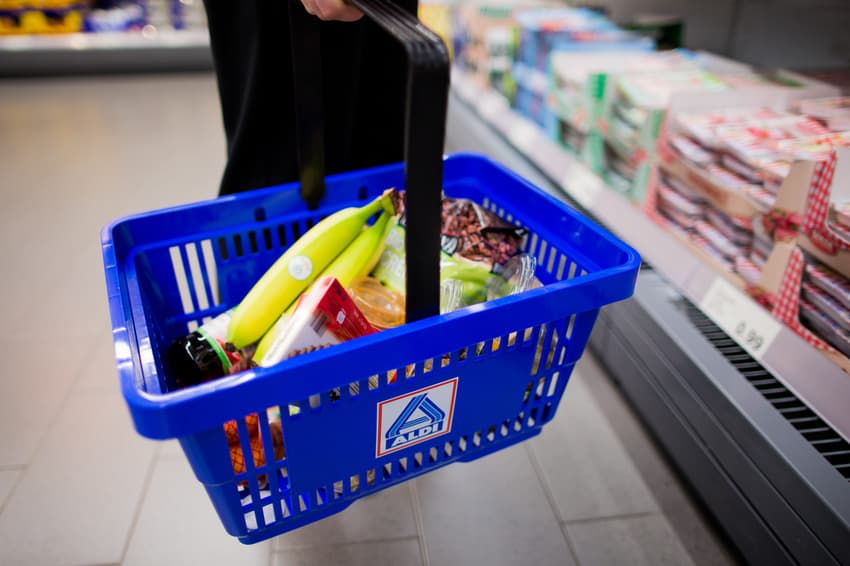German consumer prices set to rise steeply amid war in Ukraine

Russia's war in Ukraine is slowing down the economy and accelerating inflation in Germany, the Ifo Institute has claimed.
According to the Munich-based economics institute, inflation is expected to rise from 5.1 to 6.1 percent in March. This would be the steepest rise in consumer prices since 1982.
Over the past few months, consumers in Germany have already had to battle with huge hikes in energy costs, fuel prices and increases in the price of other everyday commodities.
READ ALSO:
- How the cost of living crisis is affecting everyday life in Germany
- Will Germany see a mustard shortage?
With Russia and Ukraine representing major suppliers of wheat and grain, further price rises in the food market are also expected, putting an additional strain on tight incomes.
At the same time, the ongoing conflict is set to put a dampener on the country's annual growth forecasts.
"We only expect growth of between 2.2 and 3.1 percent this year," Ifo's head of economic research Timo Wollmershäuser said on Wednesday.
Due to the increase in the cost of living, consumers in Germany could lose around €6 billion in purchasing power by the end of March alone.
With public life in Germany returning to normal and manufacturers' order books filling up, a significant rebound in the economy was expected this year.
But the war "is dampening the economy through significantly higher commodity prices, sanctions, increasing supply bottlenecks for raw materials and intermediate products as well as increased economic uncertainty", Wollmershäuser said.
Because of the current uncertainly, the Ifo Institute calculated two separate forecasts for the upcoming year.
In the optimistic scenario, the price of oil falls gradually from the current €101 per barrel to €82 by the end of the year, and the price of natural gas falls in parallel.
In the pessimistic scenario, the oil price rises to €140 per barrel by May and only then falls to €122 by the end of the year.
Energy costs have a particularly strong impact on private consumer spending.
They could rise between 3.7 and 5 percent, depending on the developments in Ukraine, sanctions on Russia and the German government's ability to source its energy.
On Wednesday, German media reported that the government was in the process of thrashing out an additional set of measures designed to support consumers with their rising energy costs.
The hotly debated measures are expected to be finalised on Wednesday evening and could include increased subsidies, a mobility allowance, a fuel rebate and a child bonus for families.
READ ALSO: KEY POINTS: Germany’s proposals for future energy price relief
In one piece of positive news, the number of unemployed people in Germany should fall to below 2.3 million, according to the Ifo Institute.
However, short-time work, known as Kurzarbeit in German, is likely to increase significantly in the pessimistic scenario.
Comments
See Also
According to the Munich-based economics institute, inflation is expected to rise from 5.1 to 6.1 percent in March. This would be the steepest rise in consumer prices since 1982.
Over the past few months, consumers in Germany have already had to battle with huge hikes in energy costs, fuel prices and increases in the price of other everyday commodities.
READ ALSO:
- How the cost of living crisis is affecting everyday life in Germany
- Will Germany see a mustard shortage?
With Russia and Ukraine representing major suppliers of wheat and grain, further price rises in the food market are also expected, putting an additional strain on tight incomes.
At the same time, the ongoing conflict is set to put a dampener on the country's annual growth forecasts.
"We only expect growth of between 2.2 and 3.1 percent this year," Ifo's head of economic research Timo Wollmershäuser said on Wednesday.
Due to the increase in the cost of living, consumers in Germany could lose around €6 billion in purchasing power by the end of March alone.
With public life in Germany returning to normal and manufacturers' order books filling up, a significant rebound in the economy was expected this year.
But the war "is dampening the economy through significantly higher commodity prices, sanctions, increasing supply bottlenecks for raw materials and intermediate products as well as increased economic uncertainty", Wollmershäuser said.
Because of the current uncertainly, the Ifo Institute calculated two separate forecasts for the upcoming year.
In the optimistic scenario, the price of oil falls gradually from the current €101 per barrel to €82 by the end of the year, and the price of natural gas falls in parallel.
In the pessimistic scenario, the oil price rises to €140 per barrel by May and only then falls to €122 by the end of the year.
Energy costs have a particularly strong impact on private consumer spending.
They could rise between 3.7 and 5 percent, depending on the developments in Ukraine, sanctions on Russia and the German government's ability to source its energy.
On Wednesday, German media reported that the government was in the process of thrashing out an additional set of measures designed to support consumers with their rising energy costs.
The hotly debated measures are expected to be finalised on Wednesday evening and could include increased subsidies, a mobility allowance, a fuel rebate and a child bonus for families.
READ ALSO: KEY POINTS: Germany’s proposals for future energy price relief
In one piece of positive news, the number of unemployed people in Germany should fall to below 2.3 million, according to the Ifo Institute.
However, short-time work, known as Kurzarbeit in German, is likely to increase significantly in the pessimistic scenario.
Join the conversation in our comments section below. Share your own views and experience and if you have a question or suggestion for our journalists then email us at [email protected].
Please keep comments civil, constructive and on topic – and make sure to read our terms of use before getting involved.
Please log in here to leave a comment.